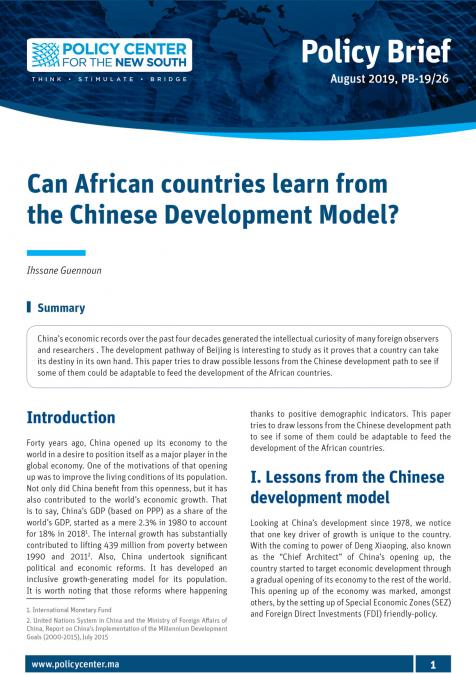Publications /
Opinion
As I arrived in Casablanca, I swerved between the crowds and baggage carousels to find someone I had never met before. That day in Casablanca was my first as a U.S. Fulbright Research Scholar seeking to learn more about Morocco’s energy sector.
Only three months into my time in Morocco, I have had the chance to befriend young Moroccans and share conversations about Morocco’s burgeoning economy and its plans to build the world’s largest solar power plant. These Moroccan youth also shared stories of their country’s struggles such as rising unemployment, climate change vulnerability, and growing political pressures to meet citizen needs. Morocco’s potential coupled with its challenges represents a microcosm of what Africa, more broadly, faces as a continent.
Promise in light of significant obstacles was one of the main themes brought up throughout the first two days of the Atlantic Dialogues here in Marrakech. Prior to attending the conference, I read about positive trends on the continent such as a growing youth population, seen an asset for sustaining a growing economy. Africa has also rapidly urbanized creating opportunities for more fluid knowledge transfer and Africa has capitalized on innovative technologies to leap across traditional infrastructure. For example, in many parts of East Africa mobile phones spread before landline phones and, consequently, mobile banking services have preceded traditional branch banking.
The trends above, however, also point to significant challenges. I heard questions from young Africans concerned about the lack of standards to ensure quality in technology innovations in the solar sector. Audience participants also brought up the challenge that a youth bulge coupled with unemployment can bring. These struggles were mentioned once again on day two when a participant pointed out the dangerous interaction of youth employment, religious extremism, and rigid national/regional identities. These issues are further complicated by climate change induced desertification, which is stressing critical natural resources such as soil and water. With reduced access to arable land and freshwater, many young farmers in the Sahel, for example, are left without employment and susceptible to the predation of violent groups. Land and water also form the bedrock of the agriculture, Africa’s largest economic sector. I am glad that the conference coupled exposure to these problems with perspectives from Emerging Leaders who are developing innovative solutions. I enjoyed learning about Oluseyi Oyenuga’s innovation to use remote monitoring technology and drone sensing to increase agricultural efficiency in Nigeria.
Moving forward, the speakers made it clear that African leaders need to be held accountable, governance mechanisms need to be improved, and technology needs to be used as a conduit for Africa to reach its economic potential. Emerging young leaders and entrepreneurs were repeatedly mentioned as the drivers of these changes but concrete steps are still being debated in forums such as the Atlantic Dialogues. During the last day of the conference, I hope to learn more about these concrete steps while also hearing from the Emerging Leaders about their ideas, start-ups, and campaigns. These avenues can help resolve the dual challenges of realizing Africa’s promising economic potential while addressing challenges such as unemployment, climate change and effective governance.
During today’s panel on African Geopolitics, Aminata Touré, the former Prime Minister of Senegal, closed by saying that the Atlantic Dialogues has been like reading 40 books over the course of a few hours. Her words describe how I feel after two days of panels, breakout dinners, and informal discussions on trends and innovations across the Atlantic. I will be leaving the Atlantic Dialogues with exposure to new ideas and innovators focused on crafting a better future across Africa and in the broader Atlantic region.
Mohammad Zia – U.S. Fulbright Scholar in Morocco
Mohammad Zia is an American born in Saudi Arabia to parents of Pakistan and Afghani descent. He was raised in New York and studied at the University of Maryland and the University of Oxford. He is passionate about natural resources management, technology innovation and public policy.




